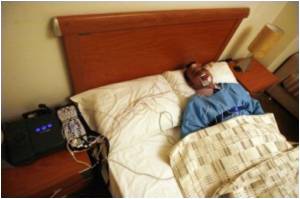Treatment for sleep apnoea could lead to better heart health too. Post treatment, such patients have lower blood fat levels and a reduced risk of heart attacks, University of Sydney researchers say.

The study was conducted at the University of Sydney's NHMRC Centre for Integrated Research and Understanding of Sleep (CIRUS) and published in the American Journal of Respiratory and Critical Care Medicine.
The researchers investigated blood fat levels across a 24-hour period after standard meals in 38 patients with sleep apnoea. Patients were studied both before and after two months of CPAP and two months with a placebo CPAP device.
"We know that blood fat levels after meals are an important predictor of future cardiovascular disease. This research provides a possible reason why patients with sleep apnoea are at increased risk of heart attacks and strokes," said lead author Dr Craig Phillips, who holds joint appointments with CIRUS and Royal North Shore Hospital.
"Although the results need to be confirmed in larger studies, we estimate that the extent of the improvement in triglycerides with CPAP could reduce the risk for heart attack in these patients by as much as 25 percent."
Study senior author, Professor Ron Grunstein from CIRUS, commented: "Another interesting aspect of the study was that triglyceride levels were particularly high in the middle of the night during sleep, almost seven hours after the evening meal.
Advertisement
The researchers are currently studying this possibility using special shiftwork simulation facilities located at the University of Sydney's Woolcock Institute.
Advertisement
Source-Medindia












